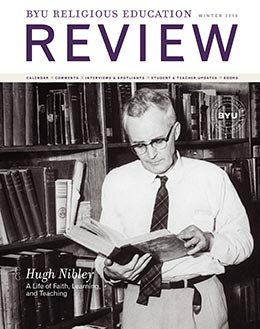KENT P. JACKSON (kent_jackson@byu.edu) IS ASSOCIATE DEAN OF RELIGION AT BYU.
Brigham Young University hosts many visitors from across the United States and from other countries. Sometimes the university hosts Muslims to visit campus and interact with faculty and students. When that happens, the university often invites Religious Education to participate in the hosting.
In 2009 we were privileged to host two groups of Muslims.
In July we were visited by an impressive group of American Muslim leaders from southern California, who came to BYU at the invitation of the Church’s Public Affairs department. One member of the group presides over an organization of about eighty mosques. Another heads an organization that deals with media relations between Muslims and other Americans. The others were likewise important leaders in the American Muslim community.
After visiting Church headquarters in Salt Lake City, the visiting Muslims spent a day at BYU with faculty members who teach and do research on Islam. When they met with faculty from Religious Education, we discussed the life of Muslims in the United States and explored various topics of belief and practice. During their visit in the Joseph Smith Building, I was accompanied by Professor Donna Lee Bowen of the Political Science faculty and Professor Ray L. Huntington of Ancient Scripture, both of whom have extensive experience living and working among Muslims. We were reminded that Muslims in America face many of the challenges that American Latter-day Saints face—how to rear children in faith and devotion to God in a hostile, secular world, how to minister to the needs of our brothers and sisters, and how to make the world a better place.
After our guests left Provo, they were taken on a VIP tour of the not-yet-dedicated Oquirrh Mountain Utah Temple. My wife, Nancy, and I were privileged to accompany the group there. It was a moving experience to visit the temple with such good and believing friends of another faith. The respect they showed for our teachings and our holy place was a model for how Latter-day Saints should act regarding the beliefs and sacred institutions of others.
In October a group of Muslims from Pakistan and Afghanistan visited BYU. This group was sponsored by an agency of the U.S. government that brings leaders from other nations to interact with Americans and learn about American political and social institutions. We were pleased to be invited to interact with these leaders as they visited the BYU campus. The group included a member of parliament, political leaders, imams of mosques, and directors of colleges and theological schools. We were aided by translators who interpreted the conversation. On that occasion, I was joined again by Professor Bowen and by Professor Brian M. Hauglid of Ancient Scripture, who teaches courses on Islam at BYU. We enjoyed very pleasant conversations in which we discussed our religions, the life experiences of our guests, and their observations from their visit to the United States. With the group were Elder Ben B. Banks and Sister Susan Banks, directors of Church hosting, with whom we have enjoyed many excellent interactions over the years as they have brought visitors to the BYU campus.
In 2008 we hosted a unique group of men from sub-Saharan Africa that included Muslim imams and Catholic and Protestant pastors and priests. One thing that made that visit memorable was the fact that our conversation with them needed to be broad enough to involve such a diverse group. We sensed that a meaningful interaction had taken place between the Christians and Muslims during the course of their stay in America. They had come to see each other as brothers, and we felt that with the visit to BYU, they could now include Latter-day Saints in that brotherhood. Indeed, one of our goals as we host these friends of other faiths is to foster the brotherhood and sisterhood we feel among each other as God’s children.
One of my favorite experiences with Muslim guests took place in 2005, when we were visited by a group from thirteen different African nations—mostly Muslim leaders of mosques and schools—who were being hosted by the U.S. government. BYU was the final stop on a trip that had taken them to many different institutions across the country. The group had spent the morning at Church headquarters in Salt Lake. During their visit there, they had been introduced to the Church, and they had many questions. When they arrived in Provo, they sought answers to their questions. It was a special experience for me to tell them the story of the Restoration and talk with them about our university and how it and its students represent the values and vision of the Church of Jesus Christ of Latter-day Saints. We had a question-and-answer session that lasted an hour and a half, covering many aspects of Latter-day Saint beliefs, history, and life. Not only was I touched and taught by their humanity and humility, but I was also moved by the words of several of my BYU colleagues as they opened their hearts to those good people.
When we said our good-byes, several of the participants, including their host from the U.S. State Department, came up to us and said, “This visit among the Mormons was the highlight of our whole trip. They saved the best for last.”
